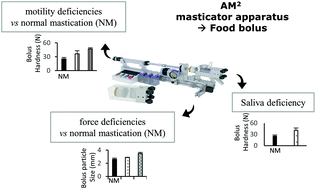Oral declines and mastication deficiencies cause alteration of food bolus properties
Abstract
In the elderly, masticatory function often presents failure in certain oral tasks due to impairment such as decline in muscular force, jaw or tongue motility, neuro-muscular coordination, tooth damage, malocclusion and saliva production. Great disparity is observed in the various and potentially cumulative oral declines that occur with ageing. Such difficulties may have an impact on food consumption and nutritional status. To obtain better understanding of the consequences of several oral deficiencies, a series of swallowable boluses were prepared in vitro with the AM2 masticator apparatus with normal and deficient programming. Physiological normal mastication (NM) was simulated using in vivo data from healthy subjects. Chewing deficiencies were reproduced by alteration of NM programming to perform different levels and combinations of force loss, lack of saliva and decrease in the motility of oral elements. Poultry meatballs were used as test-food. Particle size distribution in the food bolus was measured by sieving and rheological features (hardness, cohesiveness and elasticity) were assessed with a TPA test. Compared to the NM outcome, significant and gradual deterioration of the food bolus was observed and associated with alteration in force, saliva and motility. Combinations of several failures led to greater or cumulative deficiencies in swallowable bolus properties. For the elderly presenting a high prevalence of various oral injuries, tailoring textured food cannot be ignored as a solution for remedying deficiencies and favoring the formation of a safe-swallowable bolus, which is an essential vector of nutrients. Knowing the impacts of oral injuries on the food bolus is obviously a requisite for developing diet strategies, including nutritional items for specific populations.



 Please wait while we load your content...
Please wait while we load your content...